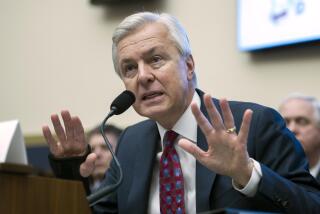Outrageous Fortunes
Two top executives at Fannie Mae deserved to be shown the door, but Fannie Mae’s directors shouldn’t have held it open while the pair made their escape pushing wheelbarrows loaded with severance pay and stock options. Former Chairman and Chief Executive Franklin D. Raines and former Chief Financial Officer Timothy Howard presided over violations of accounting rules involving derivatives trading that will probably force the mortgage giant to wipe $9 billion in supposed profits off its books. Fortunately, Fannie Mae’s no- longer-toothless regulator, the Office of Federal Housing Enterprise Oversight, has ordered that the checks not be cut until a comprehensive review is completed.
Even in this post-Enron era of supposed corporate accountability, the impunity of the imperial executive lives on. Raines should have been dismissed, and the company’s board should be finding ways to make him give back some of his past pay, rather than treating him as if he were retiring in good stead.
Some good will come from the growing political firestorm sparked by Fannie Mae’s accounting scandal, namely a push to subject Fannie Mae and sibling Freddie Mac to the same level of rigorous regulatory control as their truly private competitors in the home mortgage industry.
Coming on the heels of the Sarbanes- Oxley law, which is supposed to hold corporate chieftains accountable, the decision by Fannie Mae’s board to allow Raines to retire would be shocking at any publicly traded company. For it to happen at a company that has profited so mightily over the years from its taxpayer backing only heightens our outrage. Shareholders and taxpayers alike must now ask whether the board has met its fiduciary duties. It is allowing Raines to claim $8.7 million in deferred compensation, along with potentially lucrative stock options and a $1.4-million-a-year pension. Howard could cash in stock options now valued at $4.4 million and collect a $432,000 yearly pension. That’s on top of salary and incentives that Fannie Mae paid them between 2001 and 2003.
Raines’ last bit of creative accounting came on Dec. 21, when he resigned with the acknowledgment that he was to be held responsible for “mistakes” in Fannie Mae’s accounting. Then, with a straight face, he delivered the punch line: “By my early retirement, I have held myself accountable.”
More to Read
Inside the business of entertainment
The Wide Shot brings you news, analysis and insights on everything from streaming wars to production — and what it all means for the future.
You may occasionally receive promotional content from the Los Angeles Times.










